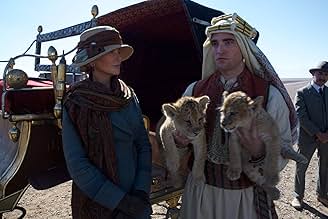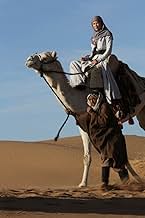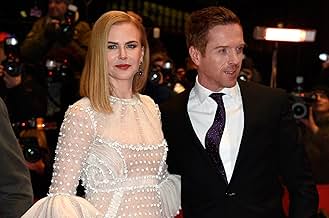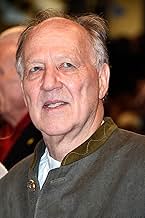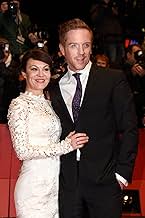VALUTAZIONE IMDb
5,7/10
13.033
LA TUA VALUTAZIONE
Una cronaca della vita di Gertrude Bell, viaggiatrice, scrittrice, archeologa, esploratrice, cartografa e rappresentante politico per l'impero britannico agli albori del XX secolo.Una cronaca della vita di Gertrude Bell, viaggiatrice, scrittrice, archeologa, esploratrice, cartografa e rappresentante politico per l'impero britannico agli albori del XX secolo.Una cronaca della vita di Gertrude Bell, viaggiatrice, scrittrice, archeologa, esploratrice, cartografa e rappresentante politico per l'impero britannico agli albori del XX secolo.
- Regia
- Sceneggiatura
- Star
- Premi
- 1 candidatura in totale
Recensioni in evidenza
This film was an attractive costume drama which would not have been out of place on Masterpiece Theater, but anyone familiar with Gertrude Bell's achievements and who has read the book 'Desert Queen', will be disappointed at how much was left out. Yes, she was born to a wealthy family, had a brilliant mind, earned a first class degree at Oxford - even attending Oxford was a rarity for a woman at that time. She mixed in the best society being very well connected socially, and also enjoyed the company of many intellectuals of the day. Yes, she fell in love with Henry Cadogan and mourned his death for seven years. She had been prevented from marrying him by her overly possessive parents on some very flimsy grounds - he was a gambler and had no fortune, when they could have easily set up a trust fund for her which he could not touch. Her parents apparently even opened her mail to ensure that she was not being led astray. Her dutiful devotion and love for her parents may have caused her later infatuations and unrequited love for the wrong men.
Her friendship with the married Doughty Wiley was shown, as was her iffy working relationship with T. E. Lawrence who supported her while being quite catty behind her back, but her later unrequited love for Henry Fitzsimmons, who used her but refused flat out to marry her, was not. Nor was her long and very close friendship with King Faisal of Iraq, which began when he was Prince and whom she had been instrumental in supporting on the throne. As Faisal's wife and family remained in Mecca and Gertrude became his close adviser, many suspected that they were lovers.
Her years of round the world tours to get over Henry's death were left out. Eventually she began her journeys through the middle east and gained the knowledge which put her in the center of things in WWI as a source of information about the Arab tribes, and supporter and close adviser to King Faisal. She was present at the Paris Peace Conference when the winners, desperate to get their hands on the oil, divided up the middle east between them, largely reneging on the promises to allow the Arabs their own kingdom and instead installing puppet kingdoms under British and French mandates.
The film ended with a very brief meeting with Faisal and his brother Abdullah, and an epilogue about the creation of Syria, Iraq and Saudi Arabia where Gertrude Bell had helped define the borders and choose the rulers. But there was much more to the story. After the heady success of helping to create the modern middle eastern kingdoms, being appointed Oriental Secretary awarded the CBE, and being Faisal's right hand woman, called upon every day not only for advice, but companionship, games, tennis, Gertrude found herself becoming less and less important as her task had ended. It probably did not help that she was a woman and had trodden on quite a few toes on the way up. Men would have felt threatened by her and wives would have been jealous. She concentrated her efforts on her writing and establishing the Baghdad Museum, but her life had become empty and no doubt she felt unwanted and useless. Faisal saw less of her and spent more time in Europe 'taking the cures'. Her family fortune disappeared in the post war changing times and she was reduced to living alone if not in poverty, but 'straightened circumstances'. In 1926 she died of an overdose of sleeping pills, which was ruled an accident.
Other than leaving half the story out, the other serious flaw was the miscasting of Faisal and Abdullah and their very brief appearance at the close of the film. The two actors should have switched parts. Abdullah, the great grandson of today's King of Jordan, was short and round faced, Faisal was tall, thin, charismatic and extremely handsome. His leadership of the Arab revolt was the reason for the allied win over the Turks. From the film one would think she had only met with Faisal for one minute. Showing more of her relationship with Faisal would have perked up the film enormously.
Overall, this topic should have been a Masterpiece Theater miniseries running for at least six hours.
Her friendship with the married Doughty Wiley was shown, as was her iffy working relationship with T. E. Lawrence who supported her while being quite catty behind her back, but her later unrequited love for Henry Fitzsimmons, who used her but refused flat out to marry her, was not. Nor was her long and very close friendship with King Faisal of Iraq, which began when he was Prince and whom she had been instrumental in supporting on the throne. As Faisal's wife and family remained in Mecca and Gertrude became his close adviser, many suspected that they were lovers.
Her years of round the world tours to get over Henry's death were left out. Eventually she began her journeys through the middle east and gained the knowledge which put her in the center of things in WWI as a source of information about the Arab tribes, and supporter and close adviser to King Faisal. She was present at the Paris Peace Conference when the winners, desperate to get their hands on the oil, divided up the middle east between them, largely reneging on the promises to allow the Arabs their own kingdom and instead installing puppet kingdoms under British and French mandates.
The film ended with a very brief meeting with Faisal and his brother Abdullah, and an epilogue about the creation of Syria, Iraq and Saudi Arabia where Gertrude Bell had helped define the borders and choose the rulers. But there was much more to the story. After the heady success of helping to create the modern middle eastern kingdoms, being appointed Oriental Secretary awarded the CBE, and being Faisal's right hand woman, called upon every day not only for advice, but companionship, games, tennis, Gertrude found herself becoming less and less important as her task had ended. It probably did not help that she was a woman and had trodden on quite a few toes on the way up. Men would have felt threatened by her and wives would have been jealous. She concentrated her efforts on her writing and establishing the Baghdad Museum, but her life had become empty and no doubt she felt unwanted and useless. Faisal saw less of her and spent more time in Europe 'taking the cures'. Her family fortune disappeared in the post war changing times and she was reduced to living alone if not in poverty, but 'straightened circumstances'. In 1926 she died of an overdose of sleeping pills, which was ruled an accident.
Other than leaving half the story out, the other serious flaw was the miscasting of Faisal and Abdullah and their very brief appearance at the close of the film. The two actors should have switched parts. Abdullah, the great grandson of today's King of Jordan, was short and round faced, Faisal was tall, thin, charismatic and extremely handsome. His leadership of the Arab revolt was the reason for the allied win over the Turks. From the film one would think she had only met with Faisal for one minute. Showing more of her relationship with Faisal would have perked up the film enormously.
Overall, this topic should have been a Masterpiece Theater miniseries running for at least six hours.
Gertrude Bell is one of the most remarkable people (of either sex) to have ever lived...but you wouldn't know it from this film. Archaeologist, mountain climber, poet, translator, linguist, explorer, diplomat, spy, (to name just a handful of her many accomplishments) and all in a time in which women were virtually prohibited from doing any of those things, for the most part, and in territories that even men of the time feared to tread. In addition to being the world's expert on both Sunni and Shiite relations before, during and after WWII, she was charged with drawing up the boundaries for modern day Iraq. She was respected, admired and desired.
But, since she was female, it took nearly a decade to green light a movie on her life and then some man decides to make her life story an epic "romance" and, of course, make the MEN in her life central to her story. How heartbreaking that her story was so terribly contrived to conform to Hollywood's stereotypes about women and women's lives. And how more tragic that this film could not even find a U.S. distributer as of this writing. This is why we live in a world that thinks women make little to no contributions to history. We rarely tell their stories and when we do, we stuff the round peg of a remarkable life into the square hole of Hollywood sexist tropes, believing no one wants to see a film with a female protagonist unless she's spending at least half the movie pining over some man in order to feel whole.
While the movie does cover many of her remarkable accomplishments, my beef with the film is the need to weigh her story down with overly melodramatic, poorly written scenes of tragic love instead of celebrating a superlative life of unique and notable triumphs. I wanted to see more on her travels, her discoveries, her diplomacy, her efforts during the war. Just gender flip this film (although it would be hard to find a man of history as accomplished in multiple fields as she was) and you'll see how ridiculous is the script's focus on what was only one facet of the brilliant gem that was Gertrude Bell.
I urge anyone interested in history to read about this woman's life. Desert Queen: The Extraordinary Life of Gertrude Bell, by Janet Wallach is a great biography.
Hollywood has perfected the fine art of trivializing and "romanticizing" women's history...yet again.
But, since she was female, it took nearly a decade to green light a movie on her life and then some man decides to make her life story an epic "romance" and, of course, make the MEN in her life central to her story. How heartbreaking that her story was so terribly contrived to conform to Hollywood's stereotypes about women and women's lives. And how more tragic that this film could not even find a U.S. distributer as of this writing. This is why we live in a world that thinks women make little to no contributions to history. We rarely tell their stories and when we do, we stuff the round peg of a remarkable life into the square hole of Hollywood sexist tropes, believing no one wants to see a film with a female protagonist unless she's spending at least half the movie pining over some man in order to feel whole.
While the movie does cover many of her remarkable accomplishments, my beef with the film is the need to weigh her story down with overly melodramatic, poorly written scenes of tragic love instead of celebrating a superlative life of unique and notable triumphs. I wanted to see more on her travels, her discoveries, her diplomacy, her efforts during the war. Just gender flip this film (although it would be hard to find a man of history as accomplished in multiple fields as she was) and you'll see how ridiculous is the script's focus on what was only one facet of the brilliant gem that was Gertrude Bell.
I urge anyone interested in history to read about this woman's life. Desert Queen: The Extraordinary Life of Gertrude Bell, by Janet Wallach is a great biography.
Hollywood has perfected the fine art of trivializing and "romanticizing" women's history...yet again.
Important to acknowledge at the outset that Herzog is not a young man. He's the same age as Scorsese and note how long it's been since Scorsese settled on being an illustrator, a lifetime. Herzog as recently as a few years ago was still venturing out in search.
Having said that, it's hard to fathom this was made by the same man who gave us Stroszek and Fitzcarraldo. In those, the place was real. The protagonists were actual lost souls, not actors feigning. The journey was about actually going where we did to tug for transcendence.
He has a female lead this time, the very first time if I'm not mistaken. He has been hobnobbing with Hollywood people for a decade, perhaps the question was put to him, perhaps he thought he had been remiss himself all this time. No matter, like so many of his characters, he gives us someone who yearns to venture outside maps, explore hazardous edges of the world.
But he has everything else be conventional and streamlined this go round. Actors stay actors whether they're playing Turkish gendarmes or Druze rebels. Oriental music swells over sand dunes like you would expect from any other film. He filmed in Morocco sets standing in for the Middle East.
So yes, atypical for Herzog, a letdown, not one of his high marks. Others fret in comments about Herzog not getting the trivia right, right to left writing and such. What's really the trouble for me is that it dulls the edge of dangerous discovery that set him apart. We're in the Lawrence of Arabia timeline anyway and the film is cut from that Hollywood cloth. We're always more or less safely ensconced.
The film has been so gracelessly attacked in reviews however it makes me want to take a step back. All or some of this would have been obvious to him while preparing anyway, so the question is, what got him out of bed and across the ocean to make this?
No answer is going to be particularly lucid I feel or avoid sounding like excuse. Maybe he couldn't resist the opportunity of going on cinematic adventure, knowing he has only a few more left. It does have the feel of those tail-end films by aging filmmakers who were past their prime but still mounting epics in the 60s.
Maybe he would explain that we're seeing through the narrator's eyes, the world as Persian poem on evanescent love, arrested love as a deeper kind of love. Ridley Scott was briefly considered to direct, no doubt there would be sweeps of battle. Something he couldn't do and Herzog does, in a strange coup, is that it's a very sweet film about yearning.
I would like to rest here. I wouldn't trust the film to be stating too much but for what it's worth; here's a Herzog tract that swaps feverish ego in the pursuit of futile escape from the confines of the world with a heart that submits to the world being confined thus and so and this doesn't stop it from journeying freely.
Islamic poets make a big deal of this, acquiescing to be simply a vessel for luminous mystery. Maybe re-read on that Rumi than get it here.
One last word. Herzog's work is done really. His journey has been vast but is coming to a close. Rather than pounce on him for a film like this, take from his legacy. Don't be a tourist of being, a sherpa of other peoples' reality. We're living in interesting times that require courageous clarity.
And I write this after finding out that IMDb have decided to close down their message boards. It has been a decade for me, more for others. I'm not one for goodbyes, but maybe this one time. Something by way of farewell to people we won't be seeing each other in some time.
Friends, visiting the Mausoleum of Poets in Tabriz wouldn't make you one, not visiting wouldn't stop you. There comes a day when you are called to the back door, going out, you will never be seen again. Learn how to move towards, how to move away, there's no other art. A tree is useful for someone who comes to chop it for firewood or turn it into furniture. May you come to rest in the shade of having less use for things that don't make the heart grow fond :)
Having said that, it's hard to fathom this was made by the same man who gave us Stroszek and Fitzcarraldo. In those, the place was real. The protagonists were actual lost souls, not actors feigning. The journey was about actually going where we did to tug for transcendence.
He has a female lead this time, the very first time if I'm not mistaken. He has been hobnobbing with Hollywood people for a decade, perhaps the question was put to him, perhaps he thought he had been remiss himself all this time. No matter, like so many of his characters, he gives us someone who yearns to venture outside maps, explore hazardous edges of the world.
But he has everything else be conventional and streamlined this go round. Actors stay actors whether they're playing Turkish gendarmes or Druze rebels. Oriental music swells over sand dunes like you would expect from any other film. He filmed in Morocco sets standing in for the Middle East.
So yes, atypical for Herzog, a letdown, not one of his high marks. Others fret in comments about Herzog not getting the trivia right, right to left writing and such. What's really the trouble for me is that it dulls the edge of dangerous discovery that set him apart. We're in the Lawrence of Arabia timeline anyway and the film is cut from that Hollywood cloth. We're always more or less safely ensconced.
The film has been so gracelessly attacked in reviews however it makes me want to take a step back. All or some of this would have been obvious to him while preparing anyway, so the question is, what got him out of bed and across the ocean to make this?
No answer is going to be particularly lucid I feel or avoid sounding like excuse. Maybe he couldn't resist the opportunity of going on cinematic adventure, knowing he has only a few more left. It does have the feel of those tail-end films by aging filmmakers who were past their prime but still mounting epics in the 60s.
Maybe he would explain that we're seeing through the narrator's eyes, the world as Persian poem on evanescent love, arrested love as a deeper kind of love. Ridley Scott was briefly considered to direct, no doubt there would be sweeps of battle. Something he couldn't do and Herzog does, in a strange coup, is that it's a very sweet film about yearning.
I would like to rest here. I wouldn't trust the film to be stating too much but for what it's worth; here's a Herzog tract that swaps feverish ego in the pursuit of futile escape from the confines of the world with a heart that submits to the world being confined thus and so and this doesn't stop it from journeying freely.
Islamic poets make a big deal of this, acquiescing to be simply a vessel for luminous mystery. Maybe re-read on that Rumi than get it here.
One last word. Herzog's work is done really. His journey has been vast but is coming to a close. Rather than pounce on him for a film like this, take from his legacy. Don't be a tourist of being, a sherpa of other peoples' reality. We're living in interesting times that require courageous clarity.
And I write this after finding out that IMDb have decided to close down their message boards. It has been a decade for me, more for others. I'm not one for goodbyes, but maybe this one time. Something by way of farewell to people we won't be seeing each other in some time.
Friends, visiting the Mausoleum of Poets in Tabriz wouldn't make you one, not visiting wouldn't stop you. There comes a day when you are called to the back door, going out, you will never be seen again. Learn how to move towards, how to move away, there's no other art. A tree is useful for someone who comes to chop it for firewood or turn it into furniture. May you come to rest in the shade of having less use for things that don't make the heart grow fond :)
Queen of the Desert breaks form with several other Herzog movies: A female lead character, a grand Hollywood-like production and most interesting: a different perspective on the culture-nature dichotomy and the effects of cultural distance that almost forms the core of Herzog's work.
It tells the story of Gertrude Bell (Kidman), an English writer and traveler who became more and more influential in the Middle East region through her unprecedented travels where she formed bonds with several future postcolonial leaders. Later in life she became involved in politics and helped to found several nation states (and determine its borders), along which Jordan and Iraq through the Hashemite dynasties. She worked in close cooperation with T.E. Lawrence (Pattison).
It is always interesting to see what's left out of the story: her efforts to establish the new countries were far more extreme and tiresome (plus the real reason Iraq was founded: cost-cutting by the British Empire), her witnessing of the Armenian genocide and slave trade, her actual spying role, her relative poverty, illness and depression later in life. What is paid attention to elaborately are her love interests (well played by Franco and Lewis), both ending in tragedy. But too much are we watching a watered-down, Hollywood interpretation of Bell by Kidman and not the real strong and intelligent woman she obviously had to be handling the complexities of deal making in the region.
Yet some typical trademarks of Herzog still shine through: travel to unknown, unmapped places where people find their cultural beliefs and visions on reality tested. In Herzog's world, venturing into nature from the cultural boundaries of existence always leads to suffering and destruction, mankind being unable to conquer the forces of nature. What makes this movie then atypical in the work of Herzog is that Bell finds solace and fulfillment through that process. Also atypical is the time we spent inside: these scenes inside the bastions of power are unfortunately not the best in the movie, and in the landscape scenes, Herzog seems much more on his turf.
Herzog always saw himself as resisting the banality of the images film is projecting, but here he somewhat contributes to that process. Despite that Queen of the Desert is still very watchable, informative and yes, even entertaining.
It tells the story of Gertrude Bell (Kidman), an English writer and traveler who became more and more influential in the Middle East region through her unprecedented travels where she formed bonds with several future postcolonial leaders. Later in life she became involved in politics and helped to found several nation states (and determine its borders), along which Jordan and Iraq through the Hashemite dynasties. She worked in close cooperation with T.E. Lawrence (Pattison).
It is always interesting to see what's left out of the story: her efforts to establish the new countries were far more extreme and tiresome (plus the real reason Iraq was founded: cost-cutting by the British Empire), her witnessing of the Armenian genocide and slave trade, her actual spying role, her relative poverty, illness and depression later in life. What is paid attention to elaborately are her love interests (well played by Franco and Lewis), both ending in tragedy. But too much are we watching a watered-down, Hollywood interpretation of Bell by Kidman and not the real strong and intelligent woman she obviously had to be handling the complexities of deal making in the region.
Yet some typical trademarks of Herzog still shine through: travel to unknown, unmapped places where people find their cultural beliefs and visions on reality tested. In Herzog's world, venturing into nature from the cultural boundaries of existence always leads to suffering and destruction, mankind being unable to conquer the forces of nature. What makes this movie then atypical in the work of Herzog is that Bell finds solace and fulfillment through that process. Also atypical is the time we spent inside: these scenes inside the bastions of power are unfortunately not the best in the movie, and in the landscape scenes, Herzog seems much more on his turf.
Herzog always saw himself as resisting the banality of the images film is projecting, but here he somewhat contributes to that process. Despite that Queen of the Desert is still very watchable, informative and yes, even entertaining.
Obviously the director of this movie does not understand the context of the middle east and he is taking this part of the world as a bulk and treating it as a whole. When in Tehran they speak Arabic, Tehran is in Iran they speak Farisi not Arabic, when in the market one guy is obviously Moroccan while the movie is narrating a middle eastern story (Amman Jordan) different dialect, and the Beddouin music always starting with Allah W Akbar which is a religious chant not necessarily specific to the middle east where you can find Christians, Kurds and a lot more ethnicity. To make long story short the director reflected his understanding of the ME based on orientalist concepts and not real facts.
Lo sapevi?
- QuizOn their first day of filming, James Franco and Nicole Kidman climbed a tower, where a vulture sat. Prior to filming the scene, Werner Herzog had found the vulture by coincidence, with its owner, by the side of the road and decided to put it into the film. The vulture was not trained for such screen roles, and tried to peck Kidman, but luckily it was on a leash. This scene is one of Kidman's favorite in the film.
- BlooperGertrude Bell and Winston Churchill 's wife Clementine were cousins on her father's side i.e. via his sister. In spite of the first scene where Churchill asks "Who is this Gertrude Bell?", in real-life he was very much aware of who she was.
- Citazioni
Gertrude Bell: Nightingale with drops in heart bleed. A fed red rose. Then came the wind. And catching her, jealous branches. I have coiled heart with a hundred thorns
- Curiosità sui creditiThe credits are shown over footage of sand blowing across the desert.
- Versioni alternativeA new cut with a running time of 110 minutes was presented at the AFI Fest in Los Angeles on Nov.8 2015. The original version, which premiered in Feb. 2015 at the Berlinale and was released in some countries, has a running time of 128 minutes.
- ConnessioniFeatured in Werner Herzog: Radical Dreamer (2022)
- Colonne sonoreLes Nubiemes Valse
from the ballet "Faust"
Written by Charles Gounod
Performed by Vaughan Jones and The Manor House String Ensemble
I più visti
Accedi per valutare e creare un elenco di titoli salvati per ottenere consigli personalizzati
- How long is Queen of the Desert?Powered by Alexa
Dettagli
- Data di uscita
- Paesi di origine
- Siti ufficiali
- Lingue
- Celebre anche come
- The Queen of the Desert
- Luoghi delle riprese
- Ait Benhaddou, Marocco(exteriors caravan scene)
- Aziende produttrici
- Vedi altri crediti dell’azienda su IMDbPro
Botteghino
- Budget
- 15.000.000 USD (previsto)
- Lordo in tutto il mondo
- 1.592.853 USD
- Tempo di esecuzione2 ore 8 minuti
- Colore
- Proporzioni
- 2.35 : 1
Contribuisci a questa pagina
Suggerisci una modifica o aggiungi i contenuti mancanti



